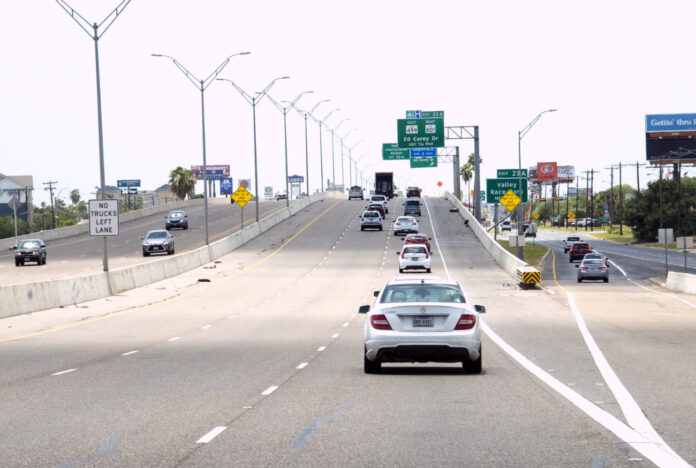State business leaders, alarmed by falling tax revenues dedicated to highway infrastructure, on Wednesday unveiled a new organization to advocate for innovative public-private partnerships to help fund highway construction projects.
The Keep Texas Moving coalition, unveiled in McAllen, is the brainchild of the Texas Association of Business, which serves as a state chamber of commerce.
The impetus behind the new organization is alarm raised by the global economic turndown accompanying COVID-19, which has been a factor in disruptions in the usual funding tools for highways, such as the oil severance tax, motor vehicle sales tax and gasoline taxes.
“ Texas adds more than a thousand new people and hundreds of vehicles to our roadways every single day,” said Aaron Cox, senior vice president for member development with the Texas Association of Business.
“ However, unfortunately, the need for improving and expanding Texas roadways is outstripping our available funding,” he added. “Texas has seen unprecedented growth in its economy and in our population in recent years but Texas roads are simply not keeping pace. That was true before even Texas was hit by the double-barreled assault of COVID-19 and the worldwide fall in energy prices.”
Keep Texas Moving envisions a public-private effort to lobby for partnerships to fund infrastructure projects which otherwise may not be viable, or may be delayed for years.
The population of Texas is forecast to grow by 12 million people in the next 20 years, from 29 million to more than 40 million by 2040 and the state’s economy is expected to double by 2050, both of which make transportation infrastructure crucial.
“ I think this is an opportune time to look at private-public partnerships in terms of investments as far as highways,” said Steve Ahlenius, CEO and president of the McAllen Chamber of Commerce. “I know Texas has done that in the past and I think there’s an opportunity to revisit that because I think we’re going to have some specific challenges when it comes to funding from the state budget and just keeping up with our growth and repair that needs to be done with highway infrastructure.”
The public-private partnerships, when it comes to infrastructure, are perhaps best-known when they arrive in the form of toll roads.
Advocates for such projects say private funding can speed project design and construction over public funding of new highways.
But Texas Department of Transportation commissioners some two years ago declared a moratorium on any new toll roads in the state, including perhaps the Valley’s most prominent project, the second causeway to South Padre Island.
Ahlenius, whose area includes key ports of entry from Mexico and major commercial truck traffic, also urged Texas lawmakers to be proactive in setting out rules for driver-less vehicles.
“ Instead of playing the game of catch-up, we see technology playing a role as a means of leapfrogging development for our region with driver-less cars and driver-less trucks,” he said. “I think that’s one of the key components. We think there are going to be great opportunities in the next five or 10 years, so we want to try to position our region to be able to take advantage of that.”
The unveiling of the new Keep Texas Moving coalition was made via Zoom online teleconference, and both Ahlenius and Cox were asked about the lagging Census 2020 counts in both Texas and the Rio Grande Valley.
Highway funding is the fifth-largest federal money stream coming into Texas, totaling $3.3 billion in fiscal 2016 and no doubt higher today.
Yet since funding allocations are made on the basis of population, a Census 2020 undercount could mean the state and the Valley miss out on significant highway funding opportunities despite the recent merger of the region’s three metropolitan planning organizations into a single unit.
“ It’s a challenge,” Ahlenius said. “This area always has seemed to have an undercount and if we make a concerted effort, it’s going to help position us over the next 10 years to receive additional funding, whether it’s for highway infrastructure, education or even medical, and that can pay huge dividends long-term for our region.”
Cox said Austin is very aware of the fact Texas ranks only at No. 40 in its self-response rate to the census, which means just 56.7 percent of households have self-reported. Here in Cameron County, the rate is just 44.5 percent, and Hidalgo County is 46.0 percent.
These low numbers could mean reduced federal funding for highways and other federal revenue streams to the state and the region.
“ It is up to us, as citizens, it’s up to us to educate ourselves, it’s up to us to reach out to our neighbors and ask the question, ‘Have you been counted?’” Cox said.
“ It’s a concerted effort across the state,” he added. “The concern level is high.”




